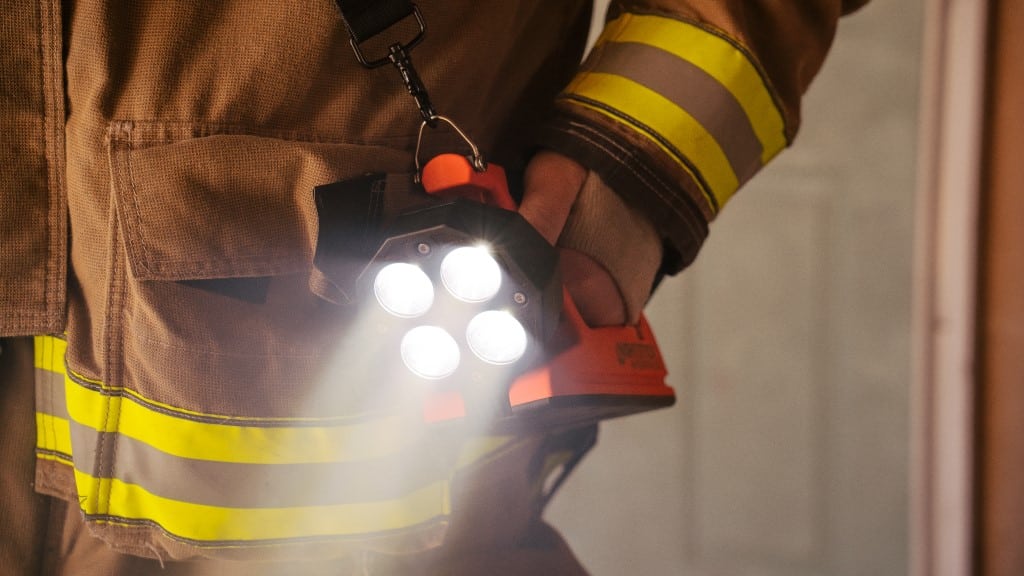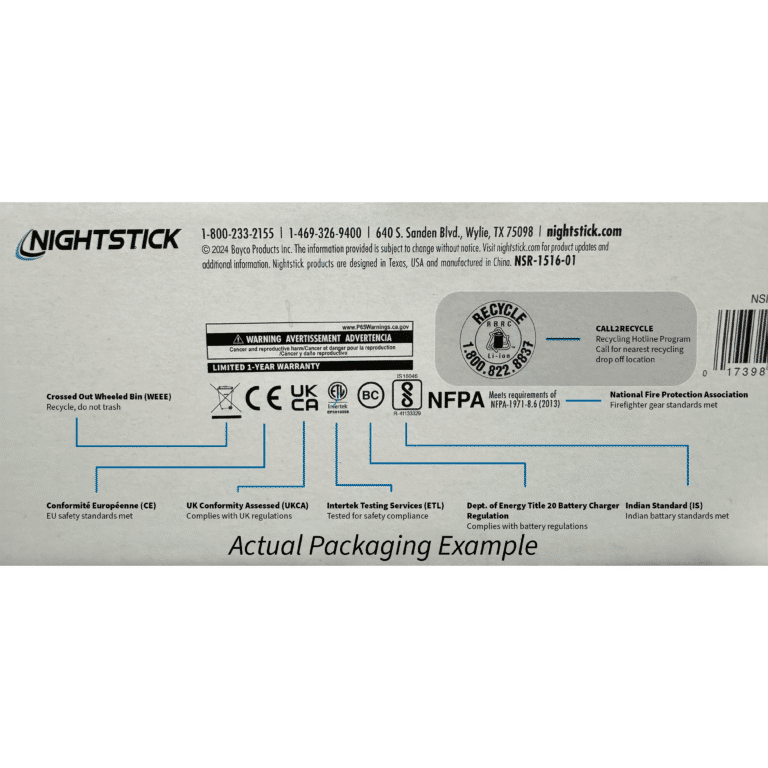The Green Spark: Nightstick looks at sustainable LED lighting
- March 27, 2024
- 3:57 pm


Iain Hoey
Share this content
Jonathan Gordon, Marketing Manager – Fire & Rescue at Nightstick, looks at sustainable LED lighting in fire safety
The fusion of LED lighting into fire safety marks a significant leap in both efficiency and environmental responsibility. Smarter tech raises the bar for the whole industry.
By focusing on powerhouse manufacturing materials aluminum and polycarbonate, Nightstick highlights a journey of innovation aimed at safeguarding our planet’s future.
This evolution in fire safety tech is a testament to Nightstick’s collective effort to continually hunt for solutions that enhance safety, optimise the first responder, and support a sustainable environment.

Aluminum: The sustainable vanguard
Aluminum stands as a pivotal element in sustainable efforts within the LED lighting industry, particularly for fire safety applications.
Its exceptional blend of durability and environmental benefits makes aluminum the material of choice for innovative designs.
The material’s lightweight yet strong nature not only extends the lifespan of LED portable lighting but also significantly reduces carbon emissions associated with transportation.
For instance, using aluminum can decrease the weight of lighting equipment by up to 40%, leading to an approximate 20% reduction in emissions compared to heavier materials.
Aluminum’s recycling process stands out for its energy efficiency, requiring only 5% of the energy necessary for its initial production.
This showcases aluminum’s eco-friendliness and emphasises its role in promoting a circular economy.
Remarkably, about 75% of all aluminum ever produced is still in use today, contributing substantially to waste reduction and resource conservation.
In 2020 alone, recycling aluminum helped to avoid approximately 90 million tons of CO2 emissions, equivalent to removing over 19 million cars from the roads for a year.
This demonstrates a strong commitment to sustainability and highlights aluminum’s importance in reducing the environmental footprint of LED lighting products.
Aluminum’s superior thermal management capabilities enhance the operational efficiency of LED lights, leading to energy savings and supporting a reduction in carbon emissions throughout the product’s lifecycle.
For example, aluminum-based LED lighting can improve energy efficiency by up to 20% due to better heat dissipation, extending the lifespan of LEDs and reducing the frequency of replacements.
Integrating aluminum into our product line, Nightstick commits to offering high-quality, durable products and promoting eco-friendly practices that benefit the environment.
Products such as Nightstick helmet lights FORGE™ and FORTEM® (XPP-5466 & XPP-5465), Tactical Fire Light W/ Multi-Angle Helmet Mount (FDL-300R-K01), and Rechargeable LED Scene Light W/ Magnetic Base (NSR-1516) exemplify strategic material choices that align with our dedication to sustainability.
Polycarbonate: A beacon of eco-innovation
Polycarbonate stands out as a high-performance thermoplastic polymer, distinguished by its clarity, strength, and impact resistance—key attributes for LED portable lighting in fire safety.
Its production process is eco-friendly, emitting 40% less greenhouse gas than conventional materials like glass or acrylic.
This represents a significant reduction, equating to approximately 250,000 tons of CO2 annually for the industry, highlighting polycarbonate’s role in minimising the ecological footprint of LED lighting.
Advancements in recycling techniques for polycarbonate have been pivotal in promoting sustainability.
Mechanical recycling, which processes used polycarbonate back into a raw material without altering its chemical structure, has seen an efficiency improvement of up to 30% over the past five years.
This method conserves resources and reduces waste, contributing to a more sustainable production cycle.
Chemical recycling, on the other hand, breaks down polycarbonate into its monomers, which can then be repurposed to produce new polymers.
This approach has been enhanced to achieve a recovery rate of over 90%, showcasing a commitment to sustainability by offering a second life to plastic materials and advancing towards a circular economy where waste and resource depletion are minimised.
The focus on innovative recycling methods and the quantifiable reduction in greenhouse gas emissions reinforce the critical role of polycarbonate in sustainable development.
By incorporating polycarbonate in products like the INTRANT® (XPR-5568), INTEGRITAS™ (XPR-5582RX), and DICATA® USB IS Dual-Light Headlamp (XPR-5562GX), Nightstick not only showcases the material’s versatility but also its substantial contribution to reducing the environmental impact of fire safety LED lighting and its manufacturing processes.
Certified green
In the critical domain of fire and rescue, where precision is paramount, the choice of materials in equipment transcends its functionality—it contains a profound commitment to a greener planet.
ATEX and UL 913, while commonly recognised for their safety benchmarks, also embody principles of environmental sustainability.
These certifications are not just procedural milestones but serve as the gold standards that join safety with eco-consciousness.
Aluminum, a central player in LED lighting, excels in meeting these standards due to its inherent non-sparking properties and exceptional thermal conductivity.
These features not only align with the stringent safety criteria of ATEX and UL 913 certifications, ensuring that LED lights meet the most rigorous safety standards, but also contribute significantly to energy conservation.
For instance, ATEX and UL 913 include requirements for energy efficiency and reduced environmental impact in their assessment protocols.
This is especially crucial in settings where the margin for error is nonexistent, helping to mitigate ignition risks while promoting the principles of intrinsic safety and sustainability.
The lifecycle of aluminum, celebrated for its high recyclability, considerably lowers its environmental footprint, directly reflecting the ethos of UL 913’s guidelines for sustainable product design.
Similarly, polycarbonate stands as its perfect counterpart.
It offers a robust, lightweight alternative to traditional materials like glass and aligns with ATEX directives that encourage the reduction of environmental hazards through material choices.
It meets the most stringent safety protocols while minimising both thermal and chemical risks, and its production slashes greenhouse gas emissions, supporting the collective drive towards sustainability.
When these materials are used in LED portable lights, they do more than just save energy and cut carbon emissions.
They also support the goal of creating a more sustainable world, which is reflected in certifications like ATEX and UL 913, which focus on environmental standards throughout the product’s life cycle.
Aluminum and polycarbonate, by meeting these environmentally-focused standards, distinguish themselves as pioneers of sustainable innovation, ensuring that the tools used in hazardous conditions also conserve our planet.
Blending rigorous safety standards with environmentally conscious materials like aluminum and polycarbonate reflects a responsible approach to our planet’s well-being while ensuring the utmost safety for firefighters and public safety officials.
This integration represents a meaningful stride towards a future where our equipment not only protects you but also honors environmental commitments.
Nightstick is proactive in championing sustainable practices, actively collaborating with recycling organisations worldwide to lead by example in product lifecycle management.
This makes sure our products are not merely used and discarded, but rather given a new purpose through recycling.
In our role as battery manufacturers, we recognise the importance of proper disposal and recycling.
That’s why we’ve partnered with Call2Recycle, a non-profit organisation dedicated to responsible battery recycling.
The Call2Recycle icon on all Nightstick products is your guide to doing right by the environment.
A quick call to the number provided on the icon will direct you to the closest recycling facility, allowing you to easily participate in the shared goal of sustainability.
Navigating the path to sustainability
The fire safety industry’s embrace of LED lighting, powered by eco-friendly materials like aluminum and polycarbonate, marks a critical step towards a more sustainable future.
Yet, achieving true environmental stewardship within this field is not without its challenges.
The energy required to recycle aluminum, approximately 14,000 kWh per ton, emphasises the need for a shift towards renewable energy sources to ease the ecological footprint of such processes.
The landscape of sustainability is brightened by the recent advent of bio-based polymers and advanced composites, which not only promise a lower environmental impact but also superior performance.
Research into bio-polymer composites, for example, indicates a potential to halve the energy needed for production when compared to traditional materials, offering a glimmer of light for both eco-efficiency and the demanding requirements of fire safety applications.
Nightstick uses the advanced composite, glass-filled nylon polymer, in products like ATEX ZONE 0 XPP-5418 IS Helmet Light Flashlight.
It’s also used in the brand new ATEX, IS angle light, SAVIOR™.
While its tensile strength rivals that of aluminum, glass-filled nylon polymer reduces the need for frequent replacement through enhancing durability and longevity.
The energy consumption also is reduced contributing to lower greenhouse gas emissions.
Brighter horizons
In the quest for an eco-friendly future, the combination of aluminum and polycarbonate into LED lighting for fire safety goes beyond technological advancement; it reflects a deep dedication to environmental protectionism.
A comprehensive lifecycle analysis of these materials—from the extraction of bauxite and crude oil, through their transformation into durable and recyclable materials, to their eventual repurposing or recycling—reveals the nuanced balance between operational efficiency and ecological responsibility.
Aluminum, celebrated for its lightweight strength and superior recyclability, lessens environmental impacts at every stage of its lifecycle, reducing the demand for virgin materials and lowering CO2 emissions through its energy-efficient recycling process.
Polycarbonate, on the other hand, offers a stark example of innovation in reducing ecological footprints, with its production emitting significantly less greenhouse gas compared to traditional materials, and advancements in recycling techniques promising a future where waste is minimised, and resources are conserved.
As we navigate towards brighter horizons, the sustainable impact of these choices becomes increasingly clear.
The fire safety industry’s embrace of LED lighting, powered by eco-friendly materials like aluminum and polycarbonate, is not just a nod to the present but a pledge for the future—a future where every product is a testament to the possibility of harmonising human safety with our planet’s health.
The journey towards sustainability is packed with challenges, yet filled with opportunities for innovation and improvement.
By focusing on the entire lifecycle of materials used in fire safety equipment, we focus our commitment to not only protecting lives but also preserving the environment for generations to come.
In this light, each beam cast by an LED light is a step forward on the path to sustainability, illuminating the way towards a legacy of conservation leadership that honors the heroes who protect us, and pledges to leave behind a world that is safer, cleaner, and greener.



